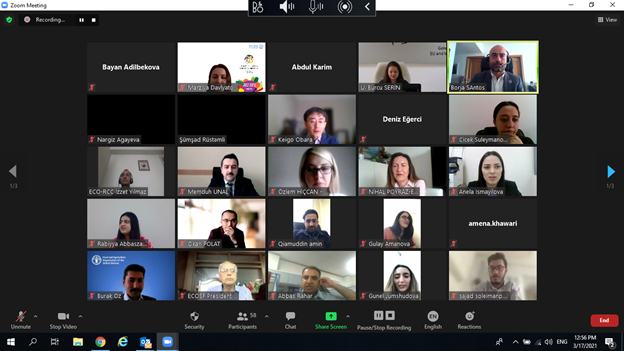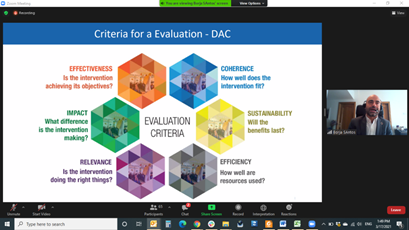Two-day Introductory Training on Project Cycle Management (PCM) for ECO Regional Food Security Programme held virtually by ECO-RCC
Go Back

A two-day virtual introductory training on Project Cycle Management (PCM) was organized by Economic Cooperation Organization Regional Coordination Centre for Food Security (ECO-RCC) on 16-17 March 2021 for the representatives of ECO countries, within the scope of a project to strengthen the Economic Cooperation Organization Regional Coordination Centre for Food Security (ECO-RCC). On behalf of ECOSF, President Prof. Dr. Manzoor Hussain Soomro and the Assistant Director Mr. Ghulam Abbas Rahar participated in the event.

Mr. Volkan Güngören, ECO-RCC Coordinator and Deputy General Director for Ministry of Agriculture and Forestry of Turkey opened the workshop. Mr. Güngören emphasized the importance of project cycle management to the successful implementation of projects designed to meet the needs of the ECO region, noting that without proper planning even the best ideas can be wasted.
 The workshop was facilitated by Dr. Borja Santos Porras, a professor from IE University in Madrid, Spain, with extensive experience in leadership, problem-solving and public policy.
The workshop was facilitated by Dr. Borja Santos Porras, a professor from IE University in Madrid, Spain, with extensive experience in leadership, problem-solving and public policy.
Ms. Sumiter Broca, Senior Officer in FAO Sub-regional Office for Central Asia in her remarks explained that the training teaches both basic and new approaches to PCM. These different approaches help users to break down complex problems into their root causes and identify possible solutions.
The training provided an opportunity for participants to learn the basics and tools of PCM, which are essential for developing and implementing projects. In addition, the training introduced the participants to some new approaches to project management including the Problem-Driven Iterative Adaptation (PDIA).
This training also aimed to improve capacities to support implementation of the new ECO Regional Programme for Food Security. In particular, it was designed to support the development of projects to alleviate food insecurity in the ECO region, where about 13 percent of the population is still food insecure.